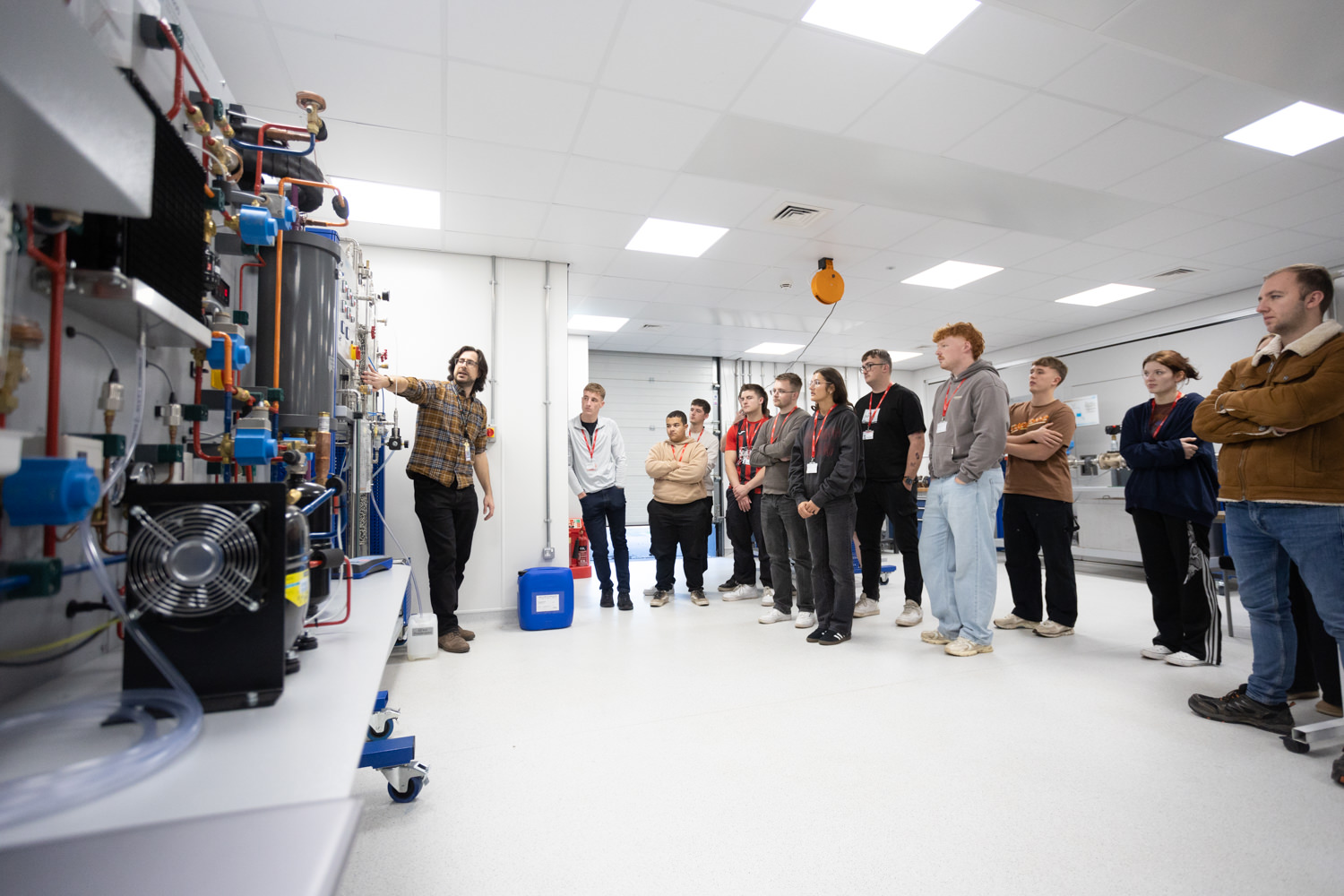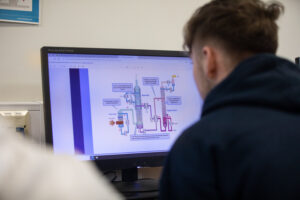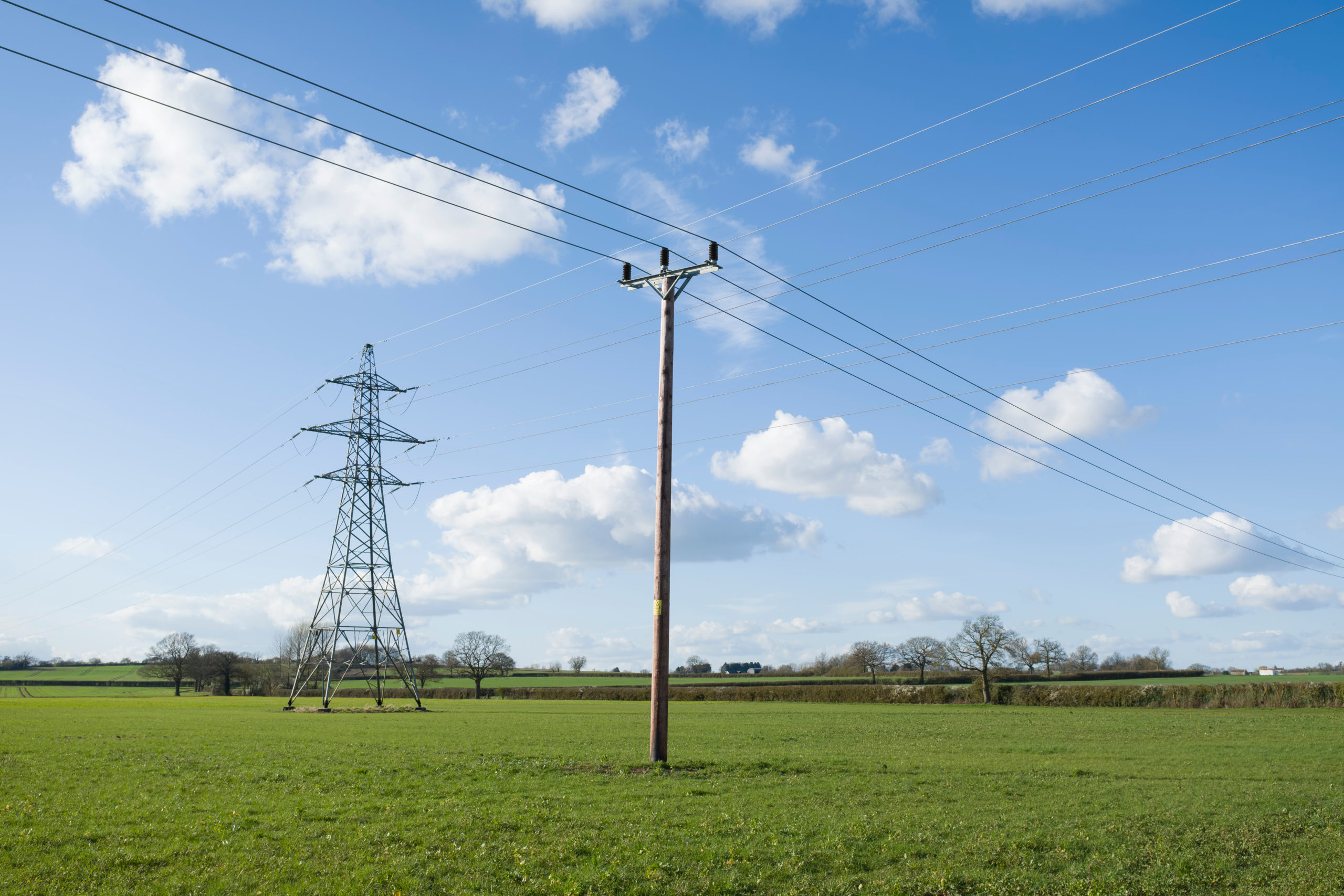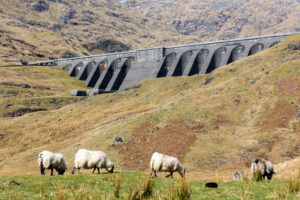
Renewable energy leader Drax is offering young people an exciting opportunity to develop the skills necessary to drive forward the carbon capture and storage (CCS) technologies of the future, including its groundbreaking Bioenergy with Carbon Capture and Storage (BECCS) project at Drax Power Station.
In collaboration with Springpod, an award-winning careers exploration platform, Drax has launched its first-ever Project Sprint, which gives students aged 14-19 a virtual experience of working as a Process Engineer as part of its BECCS project. Alongside this, Drax is offering employees at Drax Power Station the chance to upskill their CCS knowledge through an in-depth bootcamp in partnership with Selby College.
The new initiatives are part of Drax’s ongoing efforts to equip young people with the expertise they need to succeed in a rapidly evolving energy industry and help tackle climate change through innovative carbon capture solutions.
The Project Sprint is an online learning simulation, developed by Drax’s Early Careers Development team and Capital Projects engineering experts. Students will step into the shoes of a Process Engineer at Drax Power Station, exploring the role’s involvement in the BECCS project at the power station. Through a series of engaging videos and a work booklet, students will learn about the process of capturing carbon emissions, identifying potential problems, and finding solutions to ensure safety and efficiency.

Springpod’s Project Sprint allows students to learn about CCS using interactive modules.
The interactive module will give students a valuable insight into the technical aspects of carbon capture technology, while developing problem-solving skills that will support their future careers. The project also aims to inspire students to pursue careers in engineering, particularly in projects such as BECCS, which will play a pivotal role in helping the UK meet its net-zero targets.
Bruce Heppenstall, Plant Director at Drax Power Station said: “Drax’s commitment to developing the next generation of engineers is integral to our strategy for a sustainable future and both Project Springpod and our CCS Skills Bootcamp will give young people the pathway to play a part in this future.

Selby College student Max Apedaile participating in the BECCS Project Sprint.
“BECCS will bring thousands of highly skilled, well-paid jobs to the local region and it is imperative that we equip young people with the skills to design and implement not only BECCS at Drax Power Station, but the CCS projects of the future, which will be critical in the fight against climate change.”“I really enjoyed taking part in the Process Engineer virtual work experience,” said Max Apedaile, a student from Selby College who participated in the programme. “It was interesting learning about the system Drax uses for carbon capture. This is going to be a huge part of the future of engineering, and it’s important for young people like me to get involved and understand how it works.”
Sam Hyams, co-founder and CEO of Springpod, said: “Carbon capture is emerging as one of the most promising technologies in dealing with climate change. It’s critical that the next generation of young people entering the industry are equipped with the right skills. Drax’s expertise in this area provides young people with unparalleled insight and gives them the chance to test their hard skills and learn from real-world feedback.”
Adrian Haigh, Engineering Lecturer at Selby College, emphasised the value of this initiative: “The course was well put together and challenging, exactly what our students need to become competent engineers of the future. The collaboration between Drax and Selby College bridges the gap between industry needs and education, providing students with valuable insight into the technologies of today and tomorrow.”
In addition to the Project Sprint, the Carbon Capture and Storage (CCS) Skills Bootcamp, provides in-depth training in BECCS technologies, empowering the workforce of tomorrow to be leaders in sustainable energy innovation. So far over 50 Drax engineers have completed the programme, designed to upskill them ahead of BECCS deployment.

Becky Davies, Development Engineer – Process at Drax helps students undertaking the Springpod virtual work experience.
Emily Cooper, Health, Safety, and Environment (HSE) Co-ordinator at Drax, participated in the CCS Bootcamp and shared her experience: “It’s been incredibly useful to learn about the carbon capture process and how it can be scaled up for industrial use. I plan to bring this knowledge back to my team to ensure we can effectively support the BECCS projects as they move forward.”

Emily Cooper, Health, Safety, and Environment Co-ordinator at Drax, participating in the CCS Bootcamp.
Apprentice Technician, Centime Breach-Frank, added: “The CCS Bootcamp has opened up new opportunities for me in my career. I’ve gained a deeper understanding of the theory behind carbon capture and storage, and I hope to apply this knowledge in my apprenticeship as Drax advances its BECCS technology.”
Plans to deploy BECCS at Drax Power Station will require the upskilling and re-skilling of both the current and future workforce, with programmes such as the CCS skills bootcamp and Springpod’s Project Sprint proving crucial to support the 10,000 jobs BECCS will bring, and make the Yorkshire/Humber region a global centre for excellence in green skills.

Luke Varley, Head of Engineering at Drax with students from Selby College viewing a demonstration of the Springpod Project Sprint.
Drax’s collaboration with Springpod is just the beginning of these efforts to engage with and develop future talent. The company is also in the process of developing an eight-module virtual work experience programme, launching in 2025, which will be shared with over 400,000 students across the UK. This initiative will further empower young people to pursue careers in the growing sector of carbon capture and sustainable energy.
ENDS
Photo caption 1: Drax employees take part in the carbon capture and storage bootcamp at Selby College.
Media contacts:
Kieran Wilson
E: [email protected]
T: 07729092807
Editor notes
- Drax is set to be one of the first power stations in the world to convert to BECCS. When the building work for BECCS at Drax starts it will be one of country’s largest construction projects – a £2bn investment in this technology of the future, supporting thousands of high-quality and well-paid jobs, from chemical engineers to pipefitters.
- BECCS at Drax will also require upskilling and re-skilling the workforce, helping facilitate the green skills of the future, essential for the energy transition.
- Developing BECCS at Drax Power Station will deliver significant advantages for local communities and help revitalise the North of England and will support 10,000 jobs at its peak.
- The first unit of BECCS at Drax Power Station will deliver 40% of the negative emissions which are required to reach net zero in the UK, according to the Climate Change Committee.
About Drax
Drax’s purpose is to enable a zero carbon, lower cost energy future. Our strategic aims are to be a global leader in both carbon removals and sustainable biomass pellet production, and to be a UK leader in dispatchable, renewable generation.
Our operations
Drax owns and operates a portfolio of flexible, low-carbon and renewable UK power assets – biomass, hydro, and pumped storage generation – which provide dispatchable power and system support services to the electricity grid.
We are the UK’s largest source of renewable power by output, and Drax Power Station is the UK’s largest single source of renewable electricity by output.
Through our pellet production facilities in North America, Drax is the world’s second largest producer of sustainable biomass. Drax has 18 operational and development pellet production sites which will have a nameplate capacity of around 5.4 million tonnes once expansions are complete.
Drax supplies renewable electricity to UK industrial and commercial customers, offering a range of energy-related services including energy optimisation, as well as electric vehicle strategy and management.
Our future
Drax is progressing options for carbon removals using bioenergy with carbon capture and storage (BECCS) technology globally and at our UK biomass power station. We are progressing plans to develop 7 million tonnes of carbon removals through BECCS by 2030.
In 2024, we launched Elimini, a US-based company to lead our global efforts to deliver carbon removals at megaton scale. Elimini’s purpose is to remove carbon for good. To achieve this, it is convening engineers, environmentalists, communities, investors, and innovators to scale the market for carbon removals, with the aspiration of transforming our economies from carbon emitters to carbon removers. For more information, visit elimini.com.























